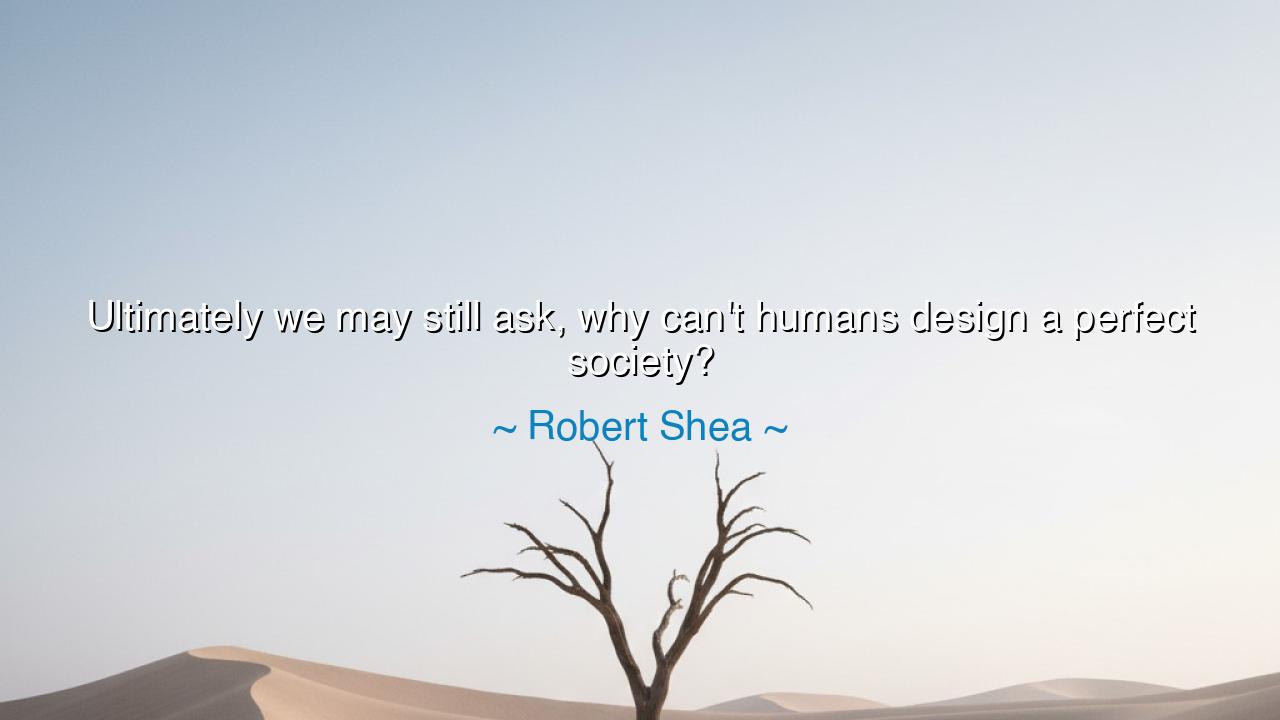
Ultimately we may still ask, why can't humans design a perfect






The words of Robert Shea — “Ultimately we may still ask, why can’t humans design a perfect society?” — echo like a question carved into the walls of civilization itself. It is a question that has haunted kings, philosophers, revolutionaries, and dreamers since the dawn of time. Within its simplicity lies a vast complexity, for it does not only ask why perfection eludes us, but what it means to be human — flawed, aspiring, and forever caught between heaven and earth. Shea, co-author of the satirical masterpiece The Illuminatus! Trilogy, spoke as both observer and prophet, revealing that the failure to design a perfect society is not a failure of intellect or science, but a reflection of the paradox within our own souls.
To understand the depth of this quote, one must look not to the stars or the machines we build, but into the heart of mankind itself. For every age has dreamed of the perfect order — the utopia where justice, harmony, and equality reign. Plato wrote of his Republic, Thomas More imagined his Utopia, and the revolutionaries of France and America sought to build their new worlds upon the ashes of the old. Yet always, after the songs of freedom faded, came division, corruption, and decay. The dream turned upon itself, as if some ancient law forbade mortals from achieving paradise on earth. Shea’s question pierces that wound: Is it possible that imperfection is woven into our very design?
The ancients would have said yes. They knew that perfection belongs to the gods, and that man’s greatness lies not in perfection, but in striving toward it. The myth of Icarus teaches this truth — that even when men build wings to rise toward the sun, their ambition carries both glory and danger. The wax melts, and they fall, yet the act of flight itself ennobles them. So too with the societies we build. Our cities, our laws, our systems — all are extensions of ourselves, and therefore share in our virtues and our vices. We may seek to design a perfect society, but as long as we are imperfect beings, what we design will reflect our contradictions. Every utopia becomes a mirror of the soul that created it — luminous in vision, but shadowed in execution.
History is filled with those who have tried to make perfection real. Consider the revolution of Lenin, who sought to build a society free of class and exploitation. The vision was grand — equality for all, brotherhood among workers, the end of oppression. Yet in pursuit of that ideal, tyranny was born, and millions perished under the weight of ideology. What began as a dream of paradise became a machinery of control. The lesson is as ancient as it is modern: when man attempts to force perfection upon others, he often destroys the very freedom and dignity that make perfection worth seeking. For perfection imposed is no longer perfection — it is slavery in disguise.
And yet, Shea’s question is not cynical. It does not mock our attempts; it mourns and marvels at them. He understood that the longing for a perfect society is a holy fire, one that has pushed humanity to improve, to refine, to heal. It is the reason we write laws, build schools, and labor for justice. The impossibility of perfection does not mean we should abandon the pursuit; rather, it reminds us to pursue it with humility. A perfect society cannot be built from steel or systems alone — it must grow from the transformation of the human heart. Until greed, fear, and pride are conquered within, no architecture of government can conquer them without.
The philosopher Marcus Aurelius once wrote, “A man’s true greatness lies in mastering himself.” And therein lies the secret answer to Shea’s question. We cannot design a perfect society because we have not yet perfected the individual. A society is but the sum of its souls, and as long as even one heart remains divided between good and evil, between love and power, the structure will bear the scars of its creators. True progress begins not in institutions, but in character — in teaching compassion, restraint, wisdom, and integrity. Only then can our designs rise closer to the ideal we dream of.
So let this question of Robert Shea be not a lament, but a call to reflection and responsibility. Do not despair that a perfect world has not been built — instead, become its foundation. Reform yourself as you would reform the world. Build kindness where systems fail, and justice where power forgets it. For though humanity may never design a perfect society, we can each strive to design a perfect heart, and from such hearts, a better world will always emerge. Thus, as the ancients taught, perfection is not a destination, but a path — and the noblest thing a mortal can do is walk it, faithfully, humbly, and with hope.






AAdministratorAdministrator
Welcome, honored guests. Please leave a comment, we will respond soon